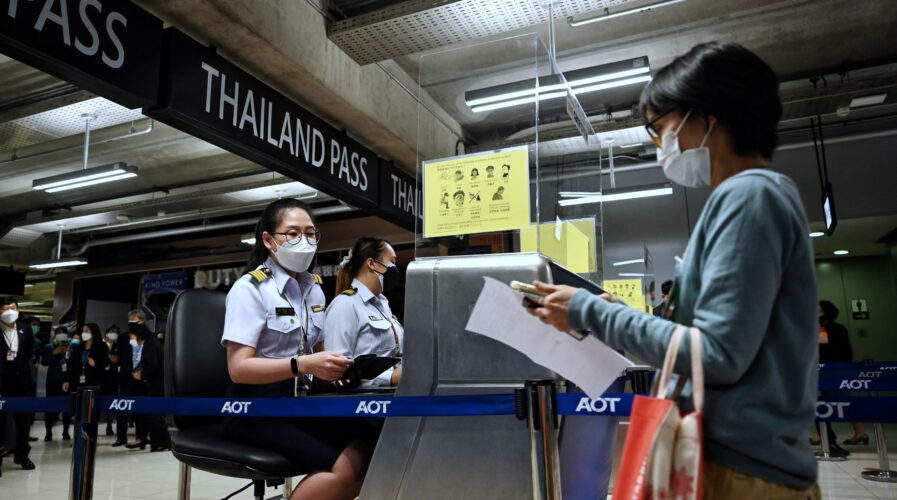
Thailand is considering crypto tourism. What could it mean for tourists? (Photo by Lillian SUWANRUMPHA / AFP)
Here’s what Thailand’s doing for crypto travel and tourism
- The Tourism Authority of Thailand is working on its own digital token, the TAT Coin, which will be accepted for travels.
- A new unit will also be set up by next year to handle the issuance of Thailand’s own crypto coin, produce a wallet, and build a new tourism ecosystem.
- The Tourism Authority’s governor believes that Thailand must be promoted as a crypto-positive society to welcome crypto millionaire tourists.
For the last few years, Thailand has constantly been ranked second in the world in terms of crypto ownership. In fact, it is estimated that over 3.6 million people or 5.2% of Thailand’s total population currently own cryptocurrency. Recognizing the potential, the country is now laying the groundwork to be a “crypto-positive community” and build a new tourism ecosystem that can attract more crypto millionaires to boost the country’s travel industry.
A Bloomberg report indicated that the Tourism Authority of Thailand (TAT) is currently working with the Securities and Exchange Commission, the Bank of Thailand, and Bitkub Online Co., the nation’s largest crypto exchange, to pave the way for the acceptance of digital tokens for travel, its Governor Yuthasak Supasorn said.
Thailand, like many other nations, still doesn’t recognize cryptocurrencies as a legal tender, hence it may take a while before travelers can actually start using Bitcoin, Ethereum and other digital tokens for travel. However, Yuthasak said the state tourism authority is laying the groundwork for its wider acceptance by the time global travel returns to normal.
To give a context on how widely crypto is in use in Thailand, 9.9% of all the internet users in the country own cryptocurrency, data suggest. To top it off, BitKub, the dominant crypto exchange in Thailand, recorded a growth of 600% in 2020 alone.
Converging crypto and travel
Yuthasak even told Bloomberg that TAT will also set up a new unit next year to handle the issuance of its own crypto coin, produce a wallet, and build a new tourism ecosystem. In fact, TAT has been looking into launching its own utility token called TAT Coin since September as part of a planned “crypto tourism” campaign.
Basically, the initiative aims to attract crypto wealthy digital nomads and the TAT has been in discussions with the Stock Exchange of Thailand regarding TAT Coin’s issuance. According to a report from the Bangkok Post last week, the infrastructure behind the TAT Coin is “ready” to go and is now awaiting the green light from the Thai government.
Even the founder and CEO Bitkub Jirayut Srupsrisopa have urged policymakers to approve the rollout of TAT Coin. “Private sectors are ready to provide digital infrastructure, but we’re just waiting for the government to press the button by enacting laws, regulations or even policies to help facilitate digital asset markets.” Srupsrisopa believes the national GDP could grow six times if the crypto market is strengthened.
The Bangkok Post report also quoted Yuthasak explaining that the “cryptourism campaign” consists of “building a new tourism ecosystem which utilizes digital technologies to allow wealthy populations, including cryptocurrency holders, to channel their money directly to tourism operators without agents or brokers.”
Thailand is among the first jurisdictions in Asia to enact cryptocurrency legislations, regulating the offering of digital assets and opening its doors to crypto-related businesses. It was in early 2018 that Thailand began to adopt a more liberal and progressive stance towards cryptocurrencies, having legalized the trading of seven approved digital currencies. Eventually, over time, regulations continued to evolve into a more sophisticated framework, with the emergence of new offerings in the digital asset space, such as security tokens and exchanges.
READ MORE
- 3 Steps to Successfully Automate Copilot for Microsoft 365 Implementation
- Trustworthy AI – the Promise of Enterprise-Friendly Generative Machine Learning with Dell and NVIDIA
- Strategies for Democratizing GenAI
- The criticality of endpoint management in cybersecurity and operations
- Ethical AI: The renewed importance of safeguarding data and customer privacy in Generative AI applications


